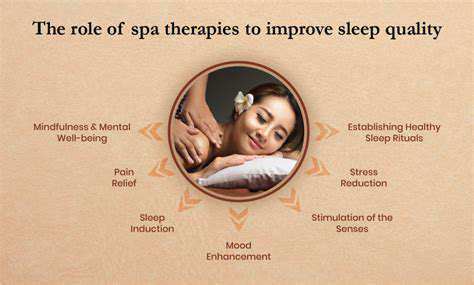Effective Therapies for Sleep Deprivation: Options to Consider
Feb 17, 2025 / zsfcdn103/
Outline
CBT-I addresses psychological and behavioral factors causing insomnia, promoting long-term sleep improvement.
Stimulus control therapy retrains the bed for sleep, associating it with sleep onset.
Sleep restriction therapy temporarily restricts time in bed to consolidate sleep and improve quality.
Cognitive therapy challenges negative thoughts about sleep, reducing anxiety and rumination.
Relaxation techniques like mindfulness help reduce arousal and improve sleep quality.
Pharmacological interventions may be used when other treatments are ineffective or severe.
Hypnotics enhance GABA activity, promoting sleep but potentially causing dependence.
Melatonin receptor agonists target circadian rhythms, often with fewer side effects.
Some antidepressants with sedative effects can be prescribed off-label for insomnia.
OTC sleep aids include antihistamines and herbal remedies, discuss use with a doctor.
Lifestyle adjustments are key for better sleep, like consistent schedules and routines.
Supportive therapies such as CBT-I are effective for sleep deprivation.
Integrating lifestyle changes and therapy creates a comprehensive treatment approach.
Therapies that Improve Sleep Quality

Cognitive Behavioral Therapy for Insomnia, often abbreviated as CBT-I, stands as a highly effective, evidence-based treatment strategy designed to address the multifaceted challenges of sleep deprivation. This therapeutic approach, unlike many pharmacological interventions, tackles the underlying psychological and behavioral factors that contribute to chronic insomnia, promoting long-term sleep improvements rather than merely masking the symptoms with medication. CBT-I is typically delivered by trained therapists and involves a structured program that equips individuals with the skills and knowledge necessary to develop healthier sleep habits and dismantle negative thought patterns that perpetuate sleep difficulties.
One of the core components of CBT-I is stimulus control therapy. This technique aims to reassociate the bed and bedroom with sleep by establishing clear rules and routines. This might include instructing individuals to only go to bed when they are sleepy, to use the bed solely for sleep and sex, and to leave the bedroom if they are unable to fall asleep within a specified timeframe. Following these guidelines meticulously helps to strengthen the connection between the bed and the state of sleep, minimizing the association between the bed and the frustration of sleeplessness, thereby creating a more conducive sleep environment and improving sleep onset latency, which is the time it takes to fall asleep.
Sleep restriction therapy is another vital element. This component involves carefully restricting the amount of time spent in bed to match the actual amount of time spent sleeping, according to the individual's sleep diary data. This method initially leads to a temporary sleep deprivation, which increases the homeostatic sleep drive, making falling asleep easier and sleep more consolidated. By gradually increasing the time in bed as sleep efficiency improves, sleep restriction helps to consolidate sleep, improve sleep quality and ultimately reduce the time spent awake in bed, leading to more restful nights. The goal is to optimize the individual’s time in bed to match their current sleep capacity, gradually increasing this time as their sleep improves.
Cognitive therapy components, also a crucial element, focuses on identifying and challenging negative thoughts and beliefs about sleep. Many individuals with insomnia develop maladaptive cognitions, such as catastrophizing about the consequences of poor sleep, overestimating the amount of sleep they need, and worrying excessively about their inability to fall asleep. The therapist helps the individual to recognize and restructure these thoughts, replacing them with more realistic and adaptive perspectives. This cognitive restructuring helps to reduce anxiety and rumination, thereby lessening the cognitive and emotional barriers to sleep and promoting a more relaxed state conducive to sleep.
Finally, relaxation techniques such as progressive muscle relaxation, deep breathing exercises, and mindfulness meditation are often incorporated into CBT-I. These techniques help to reduce the physiological arousal that often contributes to insomnia. Learning to relax the body and mind before bed can significantly improve sleep quality and reduce the likelihood of wakefulness during the night. Consistent practice of these techniques can provide individuals with the tools to self-manage their sleep problems and to cope with stress-related sleep disturbances, leading to more consistent and restorative sleep over time.
Pharmacological Interventions for Sleep Deprivation: When Medication May Be AppropriateWhile lifestyle modifications and behavioral therapies are often the first line of defense against sleep deprivation, pharmacological interventions can play a valuable role in certain situations, particularly when insomnia is severe or when other treatments have proven ineffective. These medications work by influencing the brain's neurotransmitter systems that regulate sleep-wake cycles, aiming to promote sleep onset, improve sleep maintenance, and reduce daytime sleepiness. It is important to remember that these medications should be used judiciously and under the close supervision of a healthcare provider because of the potential for side effects, dependence, and interactions with other medications.
Hypnotics are among the most common medications used for sleep deprivation. These drugs, which include both benzodiazepine receptor agonists (such as zolpidem and eszopiclone) and other agents (like suvorexant), work by enhancing the activity of gamma-aminobutyric acid (GABA), the primary inhibitory neurotransmitter in the brain. This leads to a calming effect, promoting drowsiness and sleep. The use of hypnotics is often recommended for short-term treatment of insomnia because the prolonged use of some medications can result in tolerance and dependence. It's crucial to discuss the potential risks and benefits with a healthcare professional before starting this or any other medication.
Melatonin receptor agonists, such as ramelteon, offer an alternative approach to sleep management, particularly for individuals experiencing difficulty falling asleep. These medications target the melatonin receptors in the brain, mimicking the effects of the naturally occurring hormone melatonin, which helps to regulate the sleep-wake cycle, particularly the circadian rhythm. Melatonin agonists typically have fewer side effects than traditional hypnotics and are not associated with the same risk of dependence. Therefore, they may be a good choice for individuals with circadian rhythm disorders, such as jet lag or shift-work disorder, or for older adults whose melatonin production may be reduced.
Some antidepressants, particularly those that have sedative side effects, may be prescribed off-label to treat insomnia, especially when sleep disturbances are associated with mood disorders, such as depression or anxiety. These medications work through various mechanisms, including affecting the levels of serotonin, norepinephrine, and histamine, which are all involved in sleep regulation. However, it is important to note that these medications may not be suitable for everyone, and the choice of antidepressant and the dosage will depend on individual factors, including the patient's specific symptoms and medical history. Side effects can vary and require careful consideration in consultation with a healthcare provider.
Finally, over-the-counter (OTC) sleep aids, such as antihistamines and some herbal remedies, are sometimes used for sleep deprivation. Antihistamines, which block histamine receptors in the brain, can cause drowsiness, but they can also have side effects, such as daytime sleepiness, dry mouth, and cognitive impairment, and they can become less effective over time, which means that tolerance can develop. Herbal remedies like valerian root and chamomile are often perceived as a more natural approach to sleep support; however, their efficacy is not always well-supported by scientific evidence, and interactions with other medications or potential side effects cannot be ruled out. Therefore, it is vital to discuss the use of all sleep aids, including OTC products, with a healthcare provider to ensure safe and appropriate use.
Lifestyle Adjustments and Supportive Therapies

Lifestyle Modifications for Sleep Deprivation
When it comes to addressing sleep deprivation, lifestyle adjustments play a crucial role in promoting better sleep habits and overall well-being. By establishing a consistent sleep schedule, creating a relaxing bedtime routine, and avoiding stimulating activities before bedtime, individuals can improve the quality of their sleep. Additionally, maintaining a healthy diet, engaging in regular physical activity, and managing stress levels can also contribute to improved sleep outcomes. Furthermore, creating a sleep-conducive environment, such as keeping the bedroom cool, dark, and quiet, can also help regulate sleep patterns.
In order to make these lifestyle modifications effective, it is essential to set realistic goals and make gradual changes. This can involve starting with small adjustments, such as going to bed 15 minutes earlier each night or avoiding screens for an hour before bedtime. By making these changes, individuals can develop healthy sleep habits that can help alleviate sleep deprivation. It is also important to note that these modifications may need to be tailored to an individual's specific needs and circumstances, and may require professional guidance to ensure their effectiveness.
Supportive Therapies for Sleep Deprivation
Supportive therapies, such as cognitive-behavioral therapy for insomnia (CBT-I), can be highly effective in addressing sleep deprivation. CBT-I has been shown to be a highly effective treatment for insomnia, with long-term benefits and few side effects. This type of therapy involves working with a trained therapist to identify and address underlying cognitive and behavioral factors that contribute to insomnia. By learning new skills and strategies, individuals can improve their sleep quality and reduce symptoms of insomnia. Additionally, other supportive therapies, such as relaxation techniques and mindfulness-based interventions, can also help alleviate sleep deprivation.
These supportive therapies can be used in conjunction with lifestyle modifications to enhance their effectiveness. By addressing underlying psychological and emotional factors that contribute to sleep deprivation, individuals can develop a more comprehensive approach to managing their sleep. Furthermore, supportive therapies can also provide individuals with the tools and resources they need to cope with stress and anxiety, which are common underlying causes of sleep deprivation. By incorporating these therapies into their treatment plan, individuals can improve their overall sleep quality and reduce their risk of developing chronic sleep disorders.
Integrating Lifestyle Adjustments and Supportive Therapies
Integrating lifestyle adjustments and supportive therapies can provide a comprehensive approach to addressing sleep deprivation. By combining these approaches, individuals can develop a personalized treatment plan that addresses their unique needs and circumstances. This can involve working with a healthcare professional to identify the underlying causes of sleep deprivation and develop a tailored treatment plan. Additionally, individuals can also take an active role in their treatment by making lifestyle modifications and practicing supportive therapies, such as relaxation techniques and mindfulness-based interventions.
In order to ensure the effectiveness of these combined approaches, it is essential to monitor progress and make adjustments as needed. This can involve keeping a sleep diary to track sleep patterns, monitoring symptoms of insomnia, and adjusting the treatment plan accordingly. By taking a proactive and comprehensive approach to addressing sleep deprivation, individuals can improve their overall sleep quality, reduce their risk of developing chronic sleep disorders, and enhance their overall quality of life. By prioritizing sleep health, individuals can take the first step towards achieving optimal physical and mental well-being.